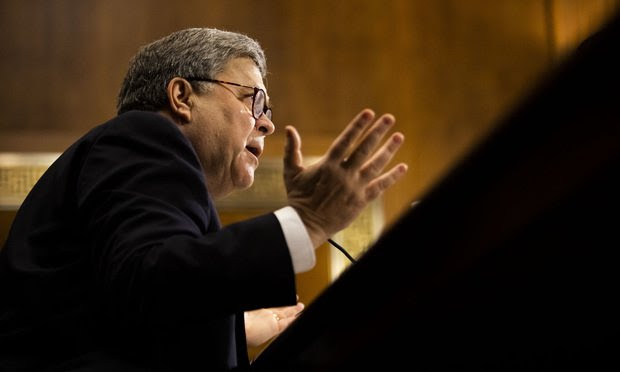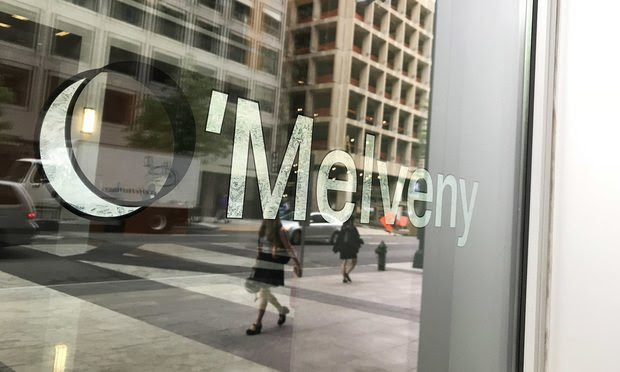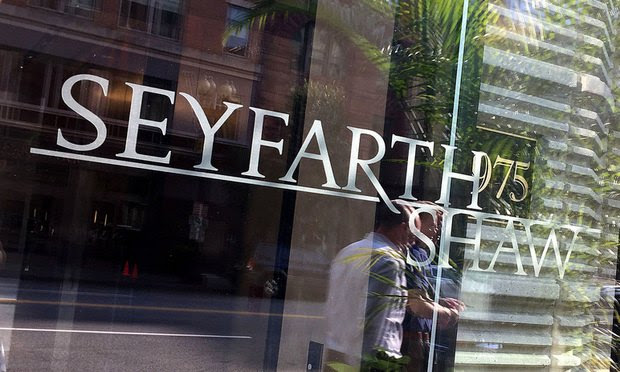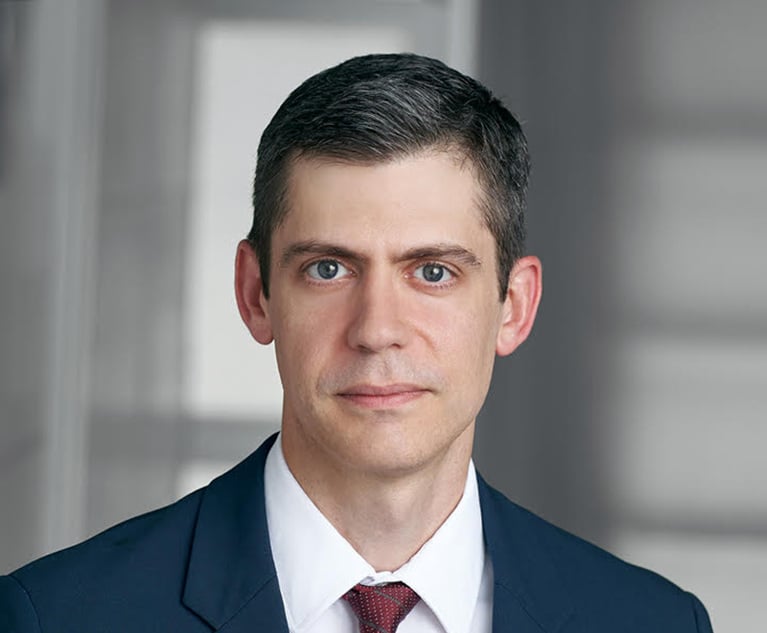Higher Law: Reefer Madness at Main Justice | Meet the Lawyers in MedMen Investor Settlement | TCPA Class Actions | All the Calendar Things
Welcome to Higher Law. This week we're looking at: Alleged antitrust reefer madness at the DOJ • Who got the MedMen settlement work • Social equity, cannabis and New Jersey's election • TCPA class actions targeting the cannabis industry. Thanks for reading!
June 25, 2020 at 04:00 PM
9 minute read
Welcome back to Higher Law, our weekly briefing on all things cannabis. I'm Cheryl Miller, reporting for Law.com from Sacramento.
This week we're looking at: Alleged antitrust reefer madness at the DOJ • Who got the MedMen settlement work • Social equity, cannabis and New Jersey's election • TCPA class actions targeting the cannabis industry
Thanks as always for reading. Send your tips, thoughts and story ideas to [email protected]. You can call me, too, at 916.448.2935. Follow me on Twitter @capitalaccounts.

Whistleblower: Anti-Pot Politics Prompted DOJ Reviews of Cannabis Mergers
U.S. Attorney General William Barr (above), Roger Stone and state-licensed marijuana. No, it's not the start to a bad joke, just an extraordinary—and for those in the cannabis industry, potentially infuriating—combination of politics and political figures to emerge from Washington, D.C. this week.
Two U.S. Department of Justice whistleblowers—an assistant U.S. attorney and an antitrust lawyer—testified in Congress on Wednesday that under Attorney General Barr's leadership political posturing has shaped enforcement actions, including the decision to retreat from an original sentencing recommendation for Roger Stone, the ally of President Trump who was convicted in 2019 of impeding a congressional investigation.
But the politics went beyond that, said John Elias, a prosecutor in the DOJ's antitrust division. Elias told members of the House Judiciary Committee that, over the objections of career attorneys, the division has conducted 10 document-intensive investigations of the cannabis industry since March 2019. The work accounted for 29 percent of the antitrust division's full-review merger investigations in fiscal year 2019, even though the market shares involved in the transactions did not rise to levels that usually triggered heightened scrutiny, Elias said.
"The head of the Antitrust Division, Assistant Attorney General [Makan] Delrahim, responded to internal concerns about these investigations at an all-staff meeting on September 17, 2019," Elias said in prepared testimony. "There, he acknowledged that the investigations were motivated by the fact that the cannabis industry is unpopular 'on the fifth floor,' a reference to Attorney General Barr's offices in the DOJ headquarters building. Personal dislike of the industry is not a proper basis upon which to ground an antitrust investigation."
The DOJ did not respond to a request for comment on Elias' allegations. During Wednesday's hearing, Congressman Doug Collins, R-Georgia, noted that the DOJ's Office of Professional Responsibility had issued a June 11 memo, obtained by Politico, finding that the investigations were permissible. Elias said that he disagreed with the office's findings.
Though the DOJ's investigations did not result in any blocked mergers, they were time-consuming and costly for the targeted companies. Medmen, PharmaCann and other cannabis operators submitted approximately 1.3 million documents, some of which prosecutors never reviewed, Elias said.
The whistleblowers' allegations infuriated Khurshid Khoja, founder of Greenbridge Corporate Counsel. Khoja was not directly involved with any of the transactions under scrutiny, but he is familiar with the delays and bills they generated.
"These companies had to spend a ton of resources that they otherwise would not have had to," Khoja said. "It's a travesty."
Khoja said he found it ironic that the DOJ was scrutinizing merger details for an industry that the federal government deems illegal.
"It was like, if you don't think the market is legitimate, why do you care?" he said.
>> Davis Wright Tremaine issued a client advisory on Thursday, saying Elias' testimony "underscores the need to be aware of and plan for the myriad ways federal policies and enforcement beyond criminal enforcement can affect businesses involved in the cannabis industry.
SPONSORED BY ALM
Announcing Two Incredible Keynote Speakers for the Women, Influence & Power in Law Conference
WIPL is known for having some of the most engaging and energizing keynote speakers attend to share their thoughts, experiences, war stories and tips on effective leadership. And this year is no exception. This year, we are grateful to welcome two remarkable women come and inspire us: Tina Tchen, the President and CEO of the "Times Up" Legal Defense Fund and Paula Boggs, Founder of Boggs Media LLC and Former Executive Vice President, General Counsel and Secretary, Law and Corporate Affairs at Starbucks from 2002-2012. READ MORE

Who Got the Work
• Last week we wrote about MedMen's settlement of an investors lawsuit. This week we have the names of lawyers involved. Claimants MMMG-MC, Inc. and Brent Cox were represented by Daniel Petrocelli and David Kirman of O'Melveny & Myers and Michael Mancini and John Shenk of Mancini Shenk, who originally filed the suit.
Defendants Adam Bierman and Andrew Modlin were represented by Robert Becher of Quinn Emanuel Urquhart & Sullivan. Entity defendants MedMen Enterprises Inc., MM CAN USA Inc., and MedMen EnterprisesUSA were represented by William Dugan and James Ward of Baker & McKenzie, and Miles Feldman of Raines Feldman. Defendant MMMG LLC was represented by DavidSergenian of Sergenian Ashby..
Other interest holders were represented by Garrett Llewellyn of Barnes & Thornburg and Stacy Harrison of Orrick Herrington & Sutcliffe.
• Barry Douglas Hunter of Frost Brown Todd has entered an appearance for CBD American Shaman LLC in a pending lawsuit for claims under the Magnuson-Moss Warranty Act. The complaint was filed May 4 in the U.S. District Court for Florida's Southern District Court by DeSouza Law on behalf of Michael S. Davis. The case is assigned to U.S. District Judge William Dimitrouleas.
• Harrang Long Gary Rudnick PC is representing Cura CS LLC in Portland federal district court in a class action alleging deceptive representations about the level of THC in a product. The law firms Larkins Vacura Kayser LLP; Bursor & Fisher; and Barbat, Mansour, Suciu & Tomina represent the plaintiffs, who filed their action in state court. Cura CS last week moved the case to federal court.

In the Weeds…
How the cannabis industry is dealing with TCPA class actions. Darren Dummit, Robert Milligan and Stanley Jutkowitz of Seyfarth Shaw write that "a target has formed on the backs of Cannabis companies for Plaintiffs' counsel looking to take advantage of the [Telephone Consumer Protection Act] and the nascent cannabis industry, which are often funded by private equity or high net worth individuals/celebrities." Cannabis companies need to thoroughly vet third-party marketing companies and take other precautions, such as regularly cross-checking the federal Do Not Call registry. [The Blunt Truth]
Ohio blocked an applicant from taking the bar exam for not disclosing he was fired over a failed drug test. The state Supreme Court said regulators were within their authority to deny Dylan Houston Phares' application to take the bar exam in 2019 after he did not disclose that he had been fired from a previous job after testing positive for marijuana. The court said Phares can reapply to take the July 2022 exam. [Court Listener]
Social equity and cannabis in New Jersey as the November election nears. Jessica Gonzalez and Brian Ellis of Bressler, Amery & Ross write that New Jersey's ballot measure to legalize cannabis, should it pass, could provide new opportunities for disadvantaged communities. "New Jersey has the late-mover advantage of being able to look to other states for social equity programs that have successfully resulted in licensure for social equity." [New Jersey Law Journal]
Using marijuana tax revenue to promote racial justice. Harris Bricken attorney Nathalie Bougenies writes about the city of Portland, Oregon this week announcing that it will redirect $27 million generated by marijuana taxes from the police department to programs focused on restorative justice. "The calls for change following George Floyd's murder help shine a spotlight on the devastating damage caused by decades of cannabis prohibition and on the need to ensure our resources get reinvested into the communities most harmed by cannabis prohibition." [Canna Law Blog]
Los Angeles is rebooting its marijuana licensing program. "The City Council, voting unanimously, gave preliminary approval to a series of revisions that would provide a jump in licenses for so-called social-equity applicants—people, many of color, who were arrested or convicted of a marijuana-related offense, and lower-income residents who live, or have lived, in neighborhoods marked by high marijuana arrest rates." [AP]

For Our Calendars: All the Things
June 26 - Voting closes for six open seats on the International Cannabis Bar Association's board of directors.
June 26 - Minorities for Medical Marijuana and the Minority Cannabis Business Association will host a live virtual event, "Dismantling Systemic Racism in the Cannabis Industry: A Call to Action."
June 29 – July 1 - MJBizConNEXT Direct takes place as a virtual event. Scheduled speakers include Robert DiPisa, co-chair of Cole Schotz' cannabis law group; Hoban Law Group counsel Bridget Hill-Zayat; Meghana Shah, partner and co-lead of Eversheds Sutherland's cannabis industry team; and Katy Young, managing partner of Ad Astra Law Group.
June 30 - Foley & Lardner and Viridian Capital Advisers present the webinar "Restructuring for Success in the Cannabis and Hemp Industry." Participants include Foley & Lardner partners Ronald Eppen, Geoffrey Goodman and Joanne Molinaro.
June 30 - Duane Morris presents the webinar "Investing in Cannabis in the COVID-19 Era." Speakers are firm partner Michael Schwamm and associate Justin Santarosa and Dino Colonna of Silver Spike Capital.
This content has been archived. It is available through our partners, LexisNexis® and Bloomberg Law.
To view this content, please continue to their sites.
Not a Lexis Subscriber?
Subscribe Now
Not a Bloomberg Law Subscriber?
Subscribe Now
NOT FOR REPRINT
© 2025 ALM Global, LLC, All Rights Reserved. Request academic re-use from www.copyright.com. All other uses, submit a request to [email protected]. For more information visit Asset & Logo Licensing.
You Might Like
View All
NY Cannabis Marketing Rulings / Rescheduling Effects / Honigman's Work on Trademark Suit / Goodbye
9 minute read
Workplace Weed and Labor Pacts / State AGs and Hemp / Maryland Licensing Suit / Vicente Sues Recruiter
9 minute readLaw Firms Mentioned
- Barnes & Thornburg
- Frost Brown Todd
- Foley & Lardner
- Seyfarth Shaw
- Bressler Amery Ross
- Orrick, Herrington & Sutcliffe
- Barnes Thornburg
- Davis Wright Tremaine
- Sutherland Asbill Brennan
- Quinn Emanuel Urquhart & Sullivan
- Baker McKenzie
- Cole, Schotz, Meisel, Forman & Leonard
- O'Melveny & Myers
- Duane Morris
Trending Stories
- 1The Public-Private Dichotomy in State-Created Insurance Entities
- 2How I Made Practice Group Chair: 'It’s a Job About People, First and Foremost,' Says Alexander Lees of Milbank
- 3Morris Nichols Names New Chief Financial Officer
- 4People in the News—Jan. 24, 2025—Klehr Harrison, Willig Williams
- 5Best Practices for Conducting Workplace Investigations: A Legal and HR Perspective
Who Got The Work
J. Brugh Lower of Gibbons has entered an appearance for industrial equipment supplier Devco Corporation in a pending trademark infringement lawsuit. The suit, accusing the defendant of selling knock-off Graco products, was filed Dec. 18 in New Jersey District Court by Rivkin Radler on behalf of Graco Inc. and Graco Minnesota. The case, assigned to U.S. District Judge Zahid N. Quraishi, is 3:24-cv-11294, Graco Inc. et al v. Devco Corporation.
Who Got The Work
Rebecca Maller-Stein and Kent A. Yalowitz of Arnold & Porter Kaye Scholer have entered their appearances for Hanaco Venture Capital and its executives, Lior Prosor and David Frankel, in a pending securities lawsuit. The action, filed on Dec. 24 in New York Southern District Court by Zell, Aron & Co. on behalf of Goldeneye Advisors, accuses the defendants of negligently and fraudulently managing the plaintiff's $1 million investment. The case, assigned to U.S. District Judge Vernon S. Broderick, is 1:24-cv-09918, Goldeneye Advisors, LLC v. Hanaco Venture Capital, Ltd. et al.
Who Got The Work
Attorneys from A&O Shearman has stepped in as defense counsel for Toronto-Dominion Bank and other defendants in a pending securities class action. The suit, filed Dec. 11 in New York Southern District Court by Bleichmar Fonti & Auld, accuses the defendants of concealing the bank's 'pervasive' deficiencies in regards to its compliance with the Bank Secrecy Act and the quality of its anti-money laundering controls. The case, assigned to U.S. District Judge Arun Subramanian, is 1:24-cv-09445, Gonzalez v. The Toronto-Dominion Bank et al.
Who Got The Work
Crown Castle International, a Pennsylvania company providing shared communications infrastructure, has turned to Luke D. Wolf of Gordon Rees Scully Mansukhani to fend off a pending breach-of-contract lawsuit. The court action, filed Nov. 25 in Michigan Eastern District Court by Hooper Hathaway PC on behalf of The Town Residences LLC, accuses Crown Castle of failing to transfer approximately $30,000 in utility payments from T-Mobile in breach of a roof-top lease and assignment agreement. The case, assigned to U.S. District Judge Susan K. Declercq, is 2:24-cv-13131, The Town Residences LLC v. T-Mobile US, Inc. et al.
Who Got The Work
Wilfred P. Coronato and Daniel M. Schwartz of McCarter & English have stepped in as defense counsel to Electrolux Home Products Inc. in a pending product liability lawsuit. The court action, filed Nov. 26 in New York Eastern District Court by Poulos Lopiccolo PC and Nagel Rice LLP on behalf of David Stern, alleges that the defendant's refrigerators’ drawers and shelving repeatedly break and fall apart within months after purchase. The case, assigned to U.S. District Judge Joan M. Azrack, is 2:24-cv-08204, Stern v. Electrolux Home Products, Inc.
Featured Firms
Law Offices of Gary Martin Hays & Associates, P.C.
(470) 294-1674
Law Offices of Mark E. Salomone
(857) 444-6468
Smith & Hassler
(713) 739-1250










